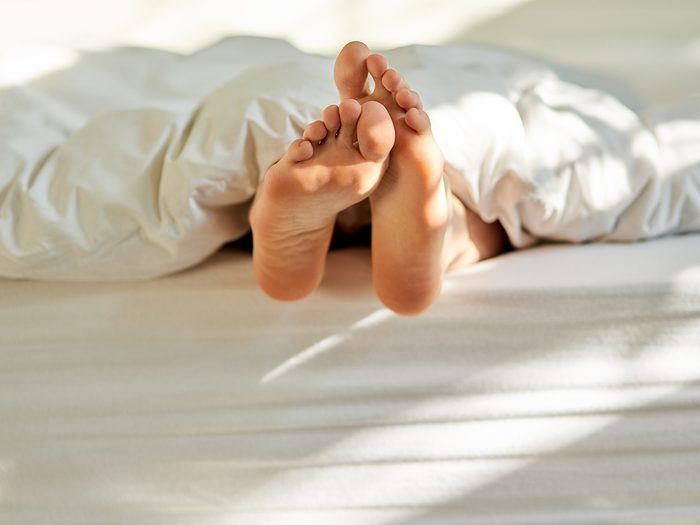Why You Always Have to Sleep Under Blankets—Even When It’s Hot

Even if you’re roasting in an airless room, chances are you’ll still get tucked in. Check out the fascinating science behind this quirky bedtime behaviour.
Each and every one of us has a favourite sleeping position—whether it’s the fetal curl, the splaying starfish, the yearner’s stretch, or the log pose. But there’s one sleep habit we all have in common, and that’s our tendency to sleep under a blanket.
Although bedding used to be a luxury reserved for the rich and powerful, such as kings and wealthy merchants, these days sleeping under a blanket is fairly universal. And even if you’re roasting in your airless room, chances are you’ll still get tucked in. What gives?
As always, science saves the day with the answers to our deepest questions. For one, your body’s core temperature drops before and during your slumber, so you need the blanket to stop your shivers.
That nightly cool down does more than simply keep you comfortable while you snooze—it’s actually a key part of what regulates the circadian rhythm that determines when your body is ready to go to sleep and when it’s ready to wake up. And it begins about an hour before you hit the sheets and continues to drop while you sleep, eventually reaching one or two degrees below your average body temperature. But once you reach the rapid eye movement (REM) sleep cycle your body loses its ability to regulate its temperature. Your blanket is there to keep you warm—even on a summer night.
There’s a behavioural element to sleeping with bedding, too. Truth be told, we’ve been conditioned to use blankets since birth.
“A blanket creates a ‘microclimate’ around the skin that is usually warmer than the surrounding environment,” says Michael Grandner, PhD, director of the Sleep and Health Research Program at the University of Arizona in Tucson. “It traps heat that escapes from the body at night, keeping the body warm. And since most people sleep with a blanket, the physical sensation of the blanket itself gets paired with sleep. This means that simply being under a blanket can cause the brain and body to be primed for sleep. It can actually trigger a sleep response.”
Research suggests that weighted blankets may be especially beneficial for people with insomnia and anxiety. A study of otherwise healthy people who suffered from chronic insomnia, published in 2015 in the Journal of Sleep Medicine & Disorders, found that those who slept under a weighted blanket reported having a calmer night’s sleep. And a review of research published in 2020 in the American Journal of Occupational Therapy suggests that people with anxiety may also benefit from sleeping with a weighted blanket.
Why? The blanket made them feel not only safe and secure, but also more comfortable.
“The perfect blanket is one that’s warm enough to keep you comfortable, but breathable enough to not accumulate moisture and sweat,” says Grandner. “It should be soft enough to get out of your way, but substantial enough that you feel it.”
If you decide to try a weighted blanket, keep in mind: The blanket’s actual weight matters. It shouldn’t be too light or heavy, noted the researchers, and the weight must be evenly distributed throughout the fabric.
Weighted or not, adds Grandner, “a soft, comfortable blanket is just relaxing and helps people drift to sleep.”
That’s reason enough to get tucked in tonight.
Next, discover 12 secrets for a good night’s sleep.






